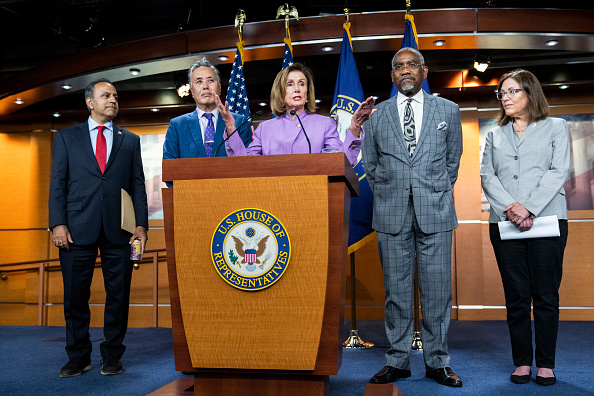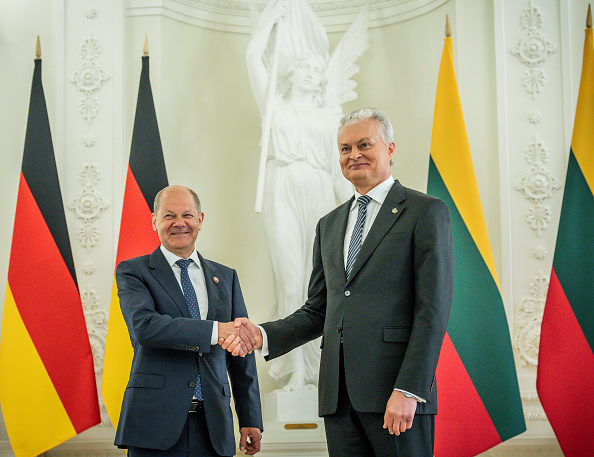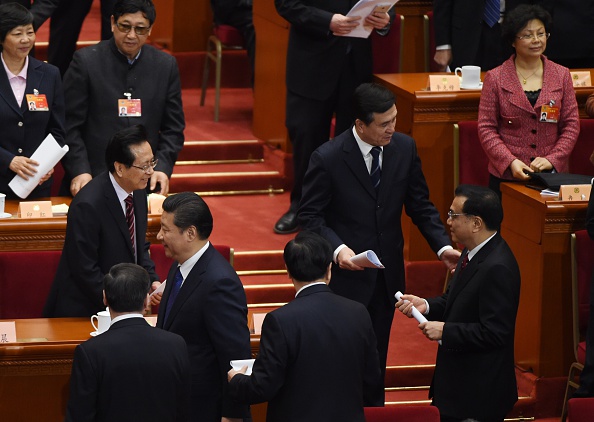
 Risky Business
Risky BusinessThe United States and Taiwan have announced a round of negotiations on a new trade and investment pact, which would cover 11 topics, including "trade facilitation, good regulatory practices, anti-corruption, SMEs, agriculture, standards, digital trade, labor, environment, state-owned enterprises, and non-market policies and practices," according to a statement by Taiwan's Office of Trade Negotiations.
The negotiations are the first step towards a pact that would deepen economic and technological ties between the United States and Taiwan after initial talks were announced in June. But relations between the United States and China have spiraled since then, following the visit of two delegations of U.S. lawmakers to Taiwan earlier this month, including House Speaker Nancy Pelosi.
The pact will "deepen our trade and investment relationship, advance mutual trade priorities based on shared values, and promote innovation and inclusive economic growth for our workers and businesses," said Deputy U.S. Trade Representative Sarah Bianchi.
Beijing immediately criticized the planned talks as a violation of its stance that Taiwan has no right to foreign relations.
Following Pelosi's visit to Taiwan, China canceled upcoming military-to-military talks and suspended joint efforts to tackle the climate crisis and China's role in the U.S. opioid crisis. Qin Gang, China's Ambassador to the U.S., said the responsibility for repairing the damage to the bilateral relationship rested solely with Washington.
Meanwhile, President Xi Jinping has announced a visit to Southeast Asia where he will meet face-to-face with President Biden in November, in what would mark the Chinese leader's first international trip in nearly three years and his first in-person meeting with Biden since his inauguration.
Read more in "Managing Sino-American Dynamics at the Precipice," by Brian Wong, a DPhil in Politics candidate and Rhodes Scholar at Balliol College, Oxford.
 Cooling Relations with Europe
Cooling Relations with EuropeAmid Western criticism of China over the escalating pressure on democratically-ruled Taiwan, which China claims as its own territory, and the strengthening of ties with Russia during the invasion of Ukraine, Beijing's diplomacy is beginning to suffer in Europe.
Estonia and Latvia have been the latest powers to quit the 17+1 mechanism, which had been designed for China to foster relations with Central and Eastern European countries. The two countries left the group amid deepening concerns over Beijing's ties with Moscow. This follows Lithuania's walkout last year, when the group shrank in an apparent failure to find common ground with Beijing.
Throughout Europe, criticism of China is increasing over its penchant to play divide-and-rule games within the EU, and Eastern European countries questioning the economic dividends.
Even Germany is considering turning away from its long-time trade partner, after a report accused China of alleged widespread human rights abuses in Western China.
And it's not only diplomatic ties that are suffering. Nearly one in four European companies in China are considering shifting their investments out of the country as the ongoing Covid outbreaks and lockdowns dim the outlook for the world's second-largest economy.
 Business in Beidaihe
Business in BeidaiheThis week, several Chinese leaders reemerged into the public spotlight for the first time in 14 days, signaling that the annual Beidaihe gathering has ended. The two-week meeting in the coastal resort of Beidaihe is one of the most secretive and anticipated events in Beijing's political calendar. While the retreat serves as an opportunity for China's most powerful leaders to relax and contemplate in an informal setting, the event is also known as the birthplace of several significant decisions in the history of Party leadership, including Deng Xiaoping's "Stern Blow" campaign of 1983.
Some analysts have noted that this year's Beidaihe was likely more of an actual vacation, as Xi Jinping is more inclined to make important decisions at monthly Politburo meetings. "He likely took the time to check in with people, give them some face time, and chat about personal matters," said Pin Ho, a veteran journalist on Chinese elite politics. The conclave also likely held a space for discussions on leadership reshuffling, as it came on the eve of a twice-a-decade leadership congress that will be held later this year.
According to the official Xinhua News Agency, following the conclusion of the gathering, Xi appeared in Jinzhou City, Liaoning province, where he urged local officials to speed up industrial restructuring and visited a museum celebrating his party's victory in the final stages of China's civil war. Premier Li Keqiang also reemerged in Shenzhen, where he advised officials to help "boost" the economy.
Prepared by China-US Focus editorial teams in Hong Kong and New York, this weekly newsletter offers you snap shots of latest trends and developments emerging from China every week, while adding a dose of historical perspective.
- 2022-08-12 Backtracking
- 2022-08-05 Cross-Strait Outrage
- 2022-07-29 Playing with Fire
- 2022-07-22 Nixonian Flexibility
- 2022-07-15 List Diplomacy
- 2022-07-08 Easing Tariffs, Not Tensions
- 2022-07-01 Getting Tough
- 2022-06-24 Tools in the Box
- 2022-06-17 Unprecedented Oversight
- 2022-06-10 Squaring Off
- 2022-06-03 Diplomatic Chills
- 2022-05-27 Competing Visions
- 2022-05-20 Common Ground
- 2022-05-13 Bilateral Interests
- 2022-05-06 Vying for Mutual Benefit
- 2022-04-29 Seeking Relief
- 2022-04-22 Tipping Point
- 2022-04-15 “Persistence is Victory”
- 2022-04-08 No Divorce
- 2022-04-01 Auditing Accountability